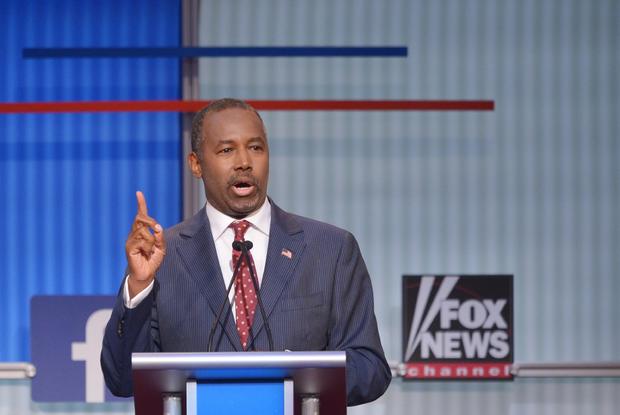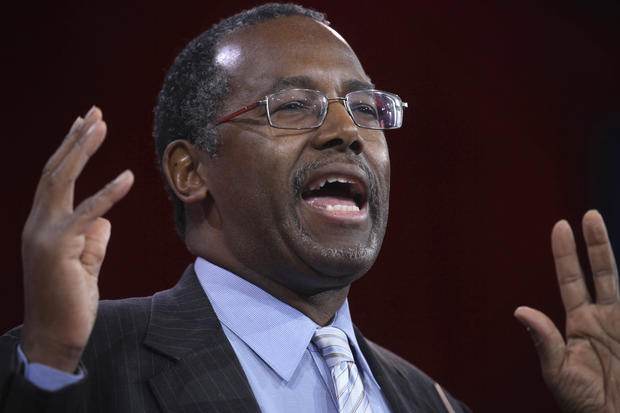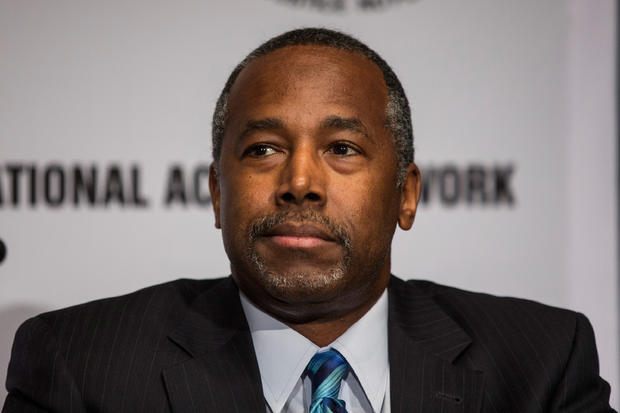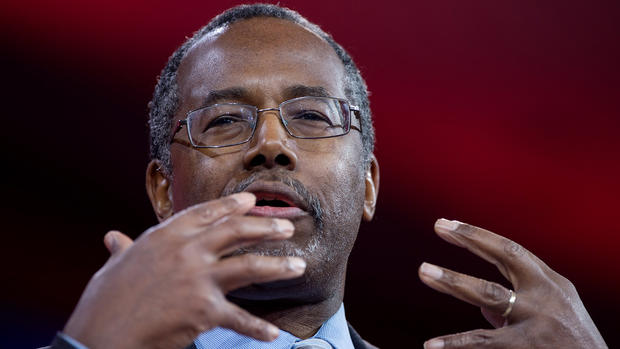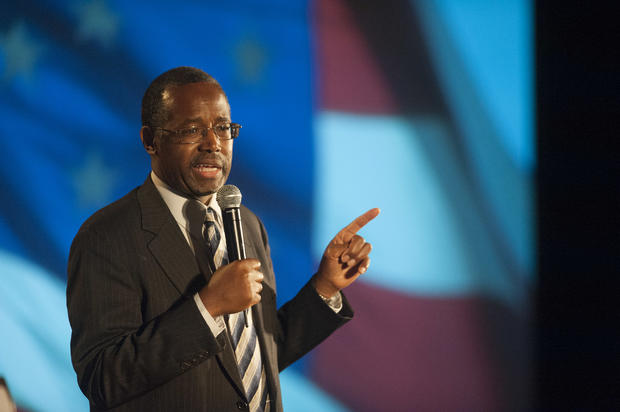Ben Carson: What does he stand for?
This article is the latest in a continuing series examining where the 2016 candidates stand on five key issues. Click here to read about Jeb Bush, Hillary Clinton, John Kasich, Bernie Sanders, Scott Walker, Marco Rubio andChris Christie.
Republican presidential candidate Ben Carson has never run for elected office before, but you wouldn't know it by looking at 2016 primary polls, which show him among the top two or three GOP contenders for the White House.
A retired neurosurgeon who rocketed to fame in 2011 by criticizing President Obama's health care policies at the National Prayer Breakfast while Mr. Obama sat just a few feet away, Carson has pitched himself as an accomplished outsider - a true outsider who will apply the smarts he exercised as a doctor to the problems of government.
He's carved out a niche for himself in the crowded GOP primary field by using his life story and his Christian faith to appeal to the party's base of social conservatives. While his lack of political experience has at times surfaced in answers that are vague or controversial, Carson has largely brushed off any criticism, saying he has no use for political correctness.
He's campaigning as one of the more conservative candidates in the GOP bullpen, appealing to the same voters courted by conservative firebrands like Texas Sen. Ted Cruz and former Arkansas Gov. Mike Huckabee. But he's doing so quietly, without the bombast employed by other candidates, like the current GOP frontrunner, Donald Trump.
Thus far, the approach seems to be paying off: recent polls show Carson in second place, behind only Trump.
Here's a look at where Ben Carson stands on the issues.
Education
Carson, the son of a poor single mother who went on to become the head of pediatric neurosurgery at Johns Hopkins, has cited his own story as an example of the power of education.
"More than most, I'm acutely aware of education being the ladder that can lead one out of poverty and into realizing the American Dream," his campaign website explains.
He's spoken out in favor of school choice, including more private school vouchers, more charter schools, and more homeschooling.
"I'm ready for school choice. We need to recognize education is the great liberator in our country," he said at the Conservative Political Action Conference in February. "No one has to be a victim."
He's also denounced Common Core state-based education standards, saying they've become a tool for the federal government to affect curriculum at the local level.
"In recent years, there has been a troubling trend of the U.S. Department of Education increasingly trying to dictate how children are educated in our primary and secondary schools," his website says. "This must stop and Common Core must be overturned."
On higher education, Carson has criticized President Obama's push for free community college, suggesting students who can't afford tuition or take out loans should simply work to pay their way through school.
"Many people get into financial strife because they don't understand the importance of work...There's nothing wrong with working a few years before going to school," he said in 2014, according to the Huffington Post. "How did we get into a big problem there? Somehow, people forgot that you don't buy a house that costs more than two-and-a-half times your annual salary...People have to use their brains. That's why God gave you a brain...so you could understand what you can and cannot afford."
Immigration
Carson has spoken out against immigration reform that would grant "amnesty" or citizenship to undocumented immigrants living in the U.S.
We "have to consider the millions of people who have immigrated here legally as well as those who are in the queue. It is incredibly unfair to them to grant amnesty to those who have jumped ahead of them in line illegally," he wrote in the Washington Times in 2014.
He's supported a guest worker program to attract foreign laborers. "People already here illegally could apply for guest-worker status from outside of the country. This means they would have to leave first. They should in no way be rewarded for having broken our laws, but if they are wise, they will arrange with their employer before they leave to immediately offer them a legal job as soon as their application is received," he wrote in an op-ed in National Review last November. "When they return, they still would not be U.S. citizens, but they would be legal, and they would be paying taxes. Only jobs that are vacant as a result of a lack of interest by American citizens should be eligible for the guest-worker program."
First and foremost, though, Carson has said the U.S. needs to secure its border with Mexico, saying no immigration solution will be complete unless Americans have confidence future illegal immigration will be stopped.
During a visit to the border last month, Carson suggested militarized drones could be used to strike caves that smugglers use to transport drugs and people between Mexico and the U.S. He later clarified that he was not suggesting the military target any people with the drone strikes.
Economy
On taxes, Carson has embraced the idea of a "proportional tax" system that would allow everybody to pay the same rate.
"We need a significantly changed taxation system. And the one that I've advocated is based on tithing, because I think God is a pretty fair guy. And he said, you know, if you give me a tithe, it doesn't matter how much you make," Carson said during the Fox News GOP primary debate last month. "So there must be something inherently fair about that. And that's why I've advocated a proportional tax system. You make $10 billion, you pay a billion. You make $10, you pay one. And everybody gets treated the same way. And you get rid of the deductions, you get rid of all the loopholes."
He's proposed significant budget cuts to reduce the deficit, writing in his 2011 book "America the Beautiful" that every government agency and department should have to cut its budget by 10 percent each year, "as long as necessary to bring the budget back into balance. This would mean there would be no sacred cows and no sparing of entitlements. No politician, agency, or special interest group could cry foul."
He's also spoken out generally against proposals to increase the social safety net, saying unemployment benefits, food stamps, and other forms of "welfare" create "dependency" that inhibits people from realizing their potential.
"It really is not compassionate to pat people on the head and say, 'There there, you poor little thing. I'm going to take care of all of your needs,'" he said in February at the Conservative Political Action Conference. "That's not compassion, that's the opposite of compassion. It's making people dependent. What real compassion is, is using our intellect to find ways to allow those people to climb out of dependency and realize the American dream."
Carson has continued railing against Obamacare, the issue that arguably made his name among conservative activists, calling it the "worst thing since slavery" and urging Congress to repeal it.
"Do I believe in health care for everybody? Absolutely," he told NBC News last year. "But I think there are much better ways to get there, which leave the care in the hands of patients and of doctors."
Carson has also taken a skeptical view of President Obama's push to combat climate change by reducing carbon emissions that heat the planet. "There's always going to be either cooling or warming going on," Carson told Bloomberg News last year. "As far as I'm concerned, that's irrelevant. What is relevant is that we have an obligation and a responsibility to protect our environment." He suggested the Environmental Protection Agency "should work "with business, industry and universities to find the most eco-friendly ways of developing our energy resources."
Social issues
Carson, a favorite among some evangelical Christians, has frequently invoked his faith on the campaign trail, and it has informed his approach to issues like same-sex marriage and abortion.
He's supported measures that would ban women from terminating a pregnancy after 20 weeks, and he's suggested society needs to re-orient the way it thinks about the abortion debate.
"There is no war on [women], the war is on their babies, Babies that cannot defend themselves," he said in 2013 at the Values Voter Summit. "Over the past few decades, we have destroyed 55 million of them. And we have the nerve to call other societies of the past heathen. What we need to do is re-educate the women to understand that they are the defenders of these babies."
Carson has also spoken out against the Supreme Court decision that legalized same-sex marriage nationwide in June. In a statement after the ruling, Carson said he "strongly disagree[d]" with the ruling, but added that it's now "the law of the land."
He called on the government to strengthen religious freedom protections to ensure Christians aren't forced "to violate their religious beliefs" by having to participate in same-sex marriages.
Carson stirred some controversy in March when he suggested being gay is a choice, not an identity, because "a lot" of straight people who go to prison come out gay. He later apologized for the remarks.
Carson has also pitched himself as a defender of the Second Amendment, saying the rights of gun-owners should not be abridged. He's suggested mass shootings are more often the result of mental illness or social problems, not lax gun laws.
Foreign policy
Carson has generally advanced a hawkish view of U.S. foreign policy, and he's suggested policymakers should be more deferential to military planners as they plot strategy.
"We want to utilize the tremendous intellect that we have in the military to win wars," he said at the Fox News debate last month. "I've talked to a lot of the generals, a lot of our advanced people. And believe me, if we gave them the mission, which is what the commander-in-chief does, they would be able to carry it out. And if we don't tie their hands behind their back, they will do it."
He's urged President Obama to step up efforts to destroy the Islamic State of Iraq and Syria, telling NBC News earlier this year the U.S. should use "every means possible" to degrade the extremist group.
He's also suggested the U.S. should send weapons to Ukrainian leaders as they try to fend off Russian aggression in the eastern part of their country. "We should be sending them what they need in order to maintain their sovereignty," he told Bloomberg News in March.
Carson has raised doubts about the push to normalize relations between the U.S. and Cuba, suggesting recent steps - like the opening of embassies in Havana and Washington, D.C. -- may not be enough to secure a more prosperous, Democratic future for the people of Cuba.
And on the nuclear deal with Iran, Carson has positioned himself in opposition. "The Iran deal announced today with fanfare and another heaping dose of false hope is almost certain to prove an historic mistake with potentially deadly consequences," he declared in July.
At times, Carson has betrayed a lack of fluency in the minutia of foreign policy (like an appearance on radio host Hugh Hewitt's show during which he seemed to suggest the Baltic States should join NATO -- an alliance in which they're already enlisted.)
In a statement to Bloomberg, Carson nodded at the fact that he has some studying to do on foreign policy issues. "Although I have visited the Baltic Rim and over 57 other countries around the world," he said, "I am still in the stage of rapidly learning about the political dynamics of global politics."
He later added in an interview, " The one thing I don't want to be lost on the American people is that leadership requires wisdom. You're going to have access to a lot of experts in a lot of areas. You don't want to devote all your attention to learning facts on a fact sheet."
